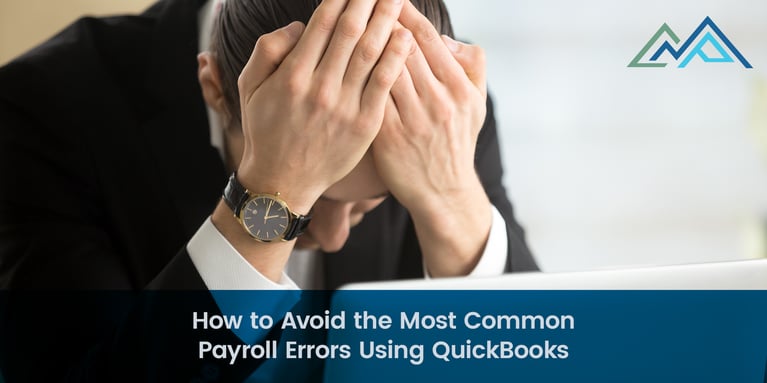Managing your company’s or small business's payroll can be frustrating & time-consuming. It’s important to handle it properly and without errors, especially when it comes to calculating and paying your taxes. If you don’t, you can run into trouble with the Internal Revenue Service.

At CMP, we understand the importance of payroll done right. In fact, one of the most common questions we get from our business clients is this:
What’s the best way to do my payroll accounting and avoid payroll errors?
That’s an important question to ask. Our answer, in brief, is that you’ll have less risk of making errors if you have the right tools for the job. We recommend using an accounting system such as QuickBooks to help you handle your payroll properly.
10 Best Accounting & Bookkeeping Software Products For Small Businesses [Reviewed]
Common Payroll Errors
Payroll errors are distressingly common and can cause issues for employees and for your business in general. If you don’t calculate your employees’ wages and payroll taxes correctly, you could wind up in trouble.
There are some payroll mistakes that happen frequently. Here are some of the most common.
Improper Classification of Workers
If your business has regular employees and contract workers – or part-time and full-time employees – then you’ve got to be careful to classify your employees properly when you run your payroll.
For regular employees, you’ll need to withhold federal and state taxes and pay them regularly. For contract workers, you’ll need a 1099 but no withholding. Failure to get it right can result in penalties.
Miscalculated Wages
If you want to avoid issues with employee dissatisfaction and back taxes, it’s important not to make mistakes when calculating your employees’ wages. Common mistakes include issues with:
- Salary changes
- Hourly rates
- Overtime
- Holiday pay
For example, if you don’t calculate overtime appropriately, you could end up under or over-paying your employee withholding. Overpaying is a nuisance, but underpayments can lead to penalties and serious issues with the IRS.
Incorrect Tax Rates
Tax rates change all the time and using improper rates can lead to big problems down the line. You need to make sure you’ve got the correct tax numbers for:
- Federal taxes, including Medicare, Social Security, and federal unemployment taxes
- State taxes include income tax and state unemployment/disability taxes
- Local taxes
Making an error with any tax rate can turn into a significant issue over time as the underpaid taxes compound.
Garnishment Errors
At times, your company may receive a notice to garnish an employee’s wages for an outstanding levy or for back child support. It’s your responsibility to garnish as directed and pay the withheld money to the appropriate party.
If you don’t do your part, you could end up in trouble – and cause your employee a significant problem with the party who’s supposed to receive the garnished wages.
Irregular Payroll Timing
Your employees depend on you to pay their wages in a timely manner. If you’re not on a solid payroll schedule, you may erode their trust in you and even lose employees.
It’s your responsibility to pay employees on time and ensure that you have the funds to cover your employees’ paychecks.
These issues are common but avoidable. It’s your responsibility to take steps to prevent payroll errors from occurring.
Solutions to Common Payroll Errors
Fortunately, there are solutions to all the problems we’ve outlined in the previous section. For example:
- Choose payroll software that tracks 1099s for you and reminds you when you need to mail them
- Maintain records of appropriate overtime rates and other employee compensation and track holiday time
- Update all tax rates and regulations as soon as changes occur
- Add information regarding wage garnishments to employee files and be sure to take all garnishments as ordered by the court
- Pay your employees’ wages on a fixed schedule
Of course, that’s all easier said than done. As a business owner, it’s your job to find a payroll solution that will help you keep track of your employees' wages, taxes, and other information to ensure that you meet your obligations and don’t get in trouble with the IRS.
How QuickBooks Makes Payroll Easier
At CMP, we highly recommend QuickBooks as a tool to help small business owners handle their payroll appropriately. QuickBooks does the following things for you:
- Keeps your payroll accounting all in one place, so you can keep track of wages, taxes, and garnishments
- Provides warnings to remind you to perform necessary tasks, such as mailing 1099 forms or paying your quarterly taxes.
- Locates incorrectly coded tax liabilities and fixes them. For example, if you accidentally use the regular Write Checks window instead of the Payroll Liabilities window to pay your taxes, it will identify payments to payroll vendors and reclassify them properly.
- Pulls the most recent federal and state tax rates and calculates taxes for you (QuickBooks Online only)
- Allows you to set up and track garnishments easily and calculates garnishments automatically when you run payroll
- Allows you to automate payroll according to your schedule
QuickBooks offers a wide selection of tools and capabilities that allow employers to avoid payroll errors and handle their payroll accounting with ease.
Conclusion
It’s important to use the proper tools when you’re running payroll. QuickBooks offers an array of solutions that will help you to avoid the most common payroll errors.
Learn more about CMP's QuickBooks payroll and bookkeeping services, and how we can help solve all your Quickbooks issues.

















